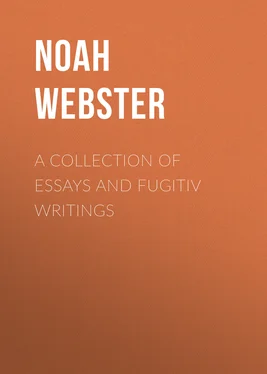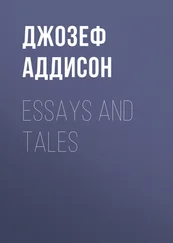Noah Webster - A Collection of Essays and Fugitiv Writings
Здесь есть возможность читать онлайн «Noah Webster - A Collection of Essays and Fugitiv Writings» — ознакомительный отрывок электронной книги совершенно бесплатно, а после прочтения отрывка купить полную версию. В некоторых случаях можно слушать аудио, скачать через торрент в формате fb2 и присутствует краткое содержание. Жанр: foreign_prose, foreign_antique, на английском языке. Описание произведения, (предисловие) а так же отзывы посетителей доступны на портале библиотеки ЛибКат.
- Название:A Collection of Essays and Fugitiv Writings
- Автор:
- Жанр:
- Год:неизвестен
- ISBN:нет данных
- Рейтинг книги:5 / 5. Голосов: 1
-
Избранное:Добавить в избранное
- Отзывы:
-
Ваша оценка:
- 100
- 1
- 2
- 3
- 4
- 5
A Collection of Essays and Fugitiv Writings: краткое содержание, описание и аннотация
Предлагаем к чтению аннотацию, описание, краткое содержание или предисловие (зависит от того, что написал сам автор книги «A Collection of Essays and Fugitiv Writings»). Если вы не нашли необходимую информацию о книге — напишите в комментариях, мы постараемся отыскать её.
A Collection of Essays and Fugitiv Writings — читать онлайн ознакомительный отрывок
Ниже представлен текст книги, разбитый по страницам. Система сохранения места последней прочитанной страницы, позволяет с удобством читать онлайн бесплатно книгу «A Collection of Essays and Fugitiv Writings», без необходимости каждый раз заново искать на чём Вы остановились. Поставьте закладку, и сможете в любой момент перейти на страницу, на которой закончили чтение.
Интервал:
Закладка:
The favorable reception given to a number of theze Essays by an indulgent public, induced me to publish them in a volum, with such alterations and emendations, az I had heerd suggested by frends or indifferent reeders, together with some manuscripts, that my own wishes led me to hope might be useful.
During the course of ten or twelv yeers, I hav been laboring to correct popular errors, and to assist my yung brethren in the road to truth and virtue; my publications for theze purposes hav been numerous; much time haz been spent, which I do not regret, and much censure incurred, which my hart tells me I do not dezerv. The influence of a yung writer cannot be so powerful or extensiv az that of an established karacter; but I hav ever thot a man's usefulness depends more on exertion than on talents . I am attached to America by berth, education and habit; but abuv all, by a philosophical view of her situation, and the superior advantages she enjoys, for augmenting the sum of social happiness.
I should hav added another volum, had not recent experience convinced me, that few large publications in this country wil pay a printer, much less an author. Should the Essays here presented to the public, proov undezerving of notice, I shal, with cheerfulness, resign my other papers to oblivion.
The reeder wil obzerv that the orthography of the volum iz not uniform. The reezon iz, that many of the essays hav been published before, in the common orthography, and it would hav been a laborious task to copy the whole, for the sake of changing the spelling.
In the essays, ritten within the last year, a considerable change of spelling iz introduced by way of experiment. This liberty waz taken by the writers before the age of queen Elizabeth, and to this we are indeted for the preference of modern spelling over that of Gower and Chaucer. The man who admits that the change of housbonde , mynde , ygone , moneth into husband , mind , gone , month , iz an improovment, must acknowlege also the riting of helth , breth , rong , tung , munth , to be an improovment. There iz no alternativ. Every possible reezon that could ever be offered for altering the spelling of wurds, stil exists in full force; and if a gradual reform should not be made in our language, it wil proov that we are less under the influence of reezon than our ancestors.
Hartford, June, 1790.
A COLLECTION OF ESSAYS
No. I
NEW YORK, 1788.
The Education of youth is, in all governments, an object of the first consequence. The impressions received in early life, usually form the characters of individuals; a union of which forms the general character of a nation.
The mode of Education and the arts taught to youth, have, in every nation, been adapted to its particular stage of society or local circumstances.
In the martial ages of Greece, the principal study of its Legislators was, to acquaint the young men with the use of arms, to inspire them with an undaunted courage, and to form in the hearts of both sexes, an invincible attachment to their country. Such was the effect of their regulations for these purposes, that the very women of Sparta and Athens, would reproach their own sons, for surviving their companions who fell in the field of battle.
Among the warlike Scythians, every male was not only taught to use arms for attack and defence; but was obliged to sleep in the field, to carry heavy burthens, and to climb rocks and precipices, in order to habituate himself to hardships, fatigue and danger.
In Persia, during the flourishing reign of the great Cyrus, the Education of youth, according to Xenophon, formed a principal branch of the regulations of the empire. The young men were divided into classes, each of which had some particular duties to perform, for which they were qualified by previous instructions and exercise.
While nations are in a barbarous state, they have few wants, and consequently few arts. Their principal objects are, defence and subsistence; the Education of a savage therefore extends little farther, than to enable him to use, with dexterity, a bow and a tomahawk.
But in the progress of manners and of arts, war ceases to be the employment of whole nations; it becomes the business of a few, who are paid for defending their country. Artificial wants multiply the number of occupations; and these require a great diversity in the mode of Education. Every youth must be instructed in the business by which he is to procure subsistence. Even the civilities of behavior, in polished society, become a science; a bow and a curtesy are taught with as much care and precision, as the elements of Mathematics. Education proceeds therefore, by gradual advances, from simplicity to corruption. Its first object, among rude nations, is safety; its next, utility; it afterwards extends to convenience; and among the opulent part of civilized nations, it is directed principally to show and amusement.
In despotic states, Education, like religion, is made subservient to government. In some of the vast empires of Asia, children are always instructed in the occupation of their parents; thus the same arts are always continued in the same families. Such an institution cramps genius, and limits the progress of national improvement; at the same time it is an almost immoveable barrier against the introduction of vice, luxury, faction and changes in government. This is one of the principal causes, which have operated in combining numerous millions of the human race under one form of government, and preserving national tranquillity for incredible periods of time. The empire of China, whose government was founded on the patriarchical discipline, has not suffered a revolution in laws, manners or language, for many thousand years.
In the complicated systems of government which are established among the civilized nations of Europe, Education has less influence in forming a national character; but there is no state, in which it has not an inseparable connection with morals, and a consequential influence upon the peace and happiness of society.
Education is a subject which has been exhausted by the ablest writers, both among the ancients and moderns. I am not vain enough to suppose I can suggest any new ideas upon so trite a theme as Education in general; but perhaps the manner of conducting the youth in America may be capable of some improvement. Our constitutions of civil government are not yet firmly established; our national character is not yet formed; and it is an object of vast magnitude that systems of Education should be adopted and pursued, which may not only diffuse a knowlege of the sciences, but may implant, in the minds of the American youth, the principles of virtue and of liberty; and inspire them with just and liberal ideas of government, and with an inviolable attachment to their own country. It now becomes every American to examin the modes of Education in Europe, to see how far they are applicable in this country, and whether it is not possible to make some valuable alterations, adapted to our local and political circumstances. Let us examin the subject in two views. First, as it respects arts and sciences. Secondly, as it is connected with morals and government. In each of these articles, let us see what errors may be found, and what improvements suggested, in our present practice.
The first error that I would mention, is, a too general attention to the dead languages, with a neglect of our own.
This practice proceeds probably from the common use of the Greek and Roman tongues, before the English was brought to perfection. There was a long period of time, when these languages were almost the only repositories of science in Europe. Men, who had a taste for learning, were under a necessity of recurring to the sources, the Greek and Roman authors. These will ever be held in the highest estimation both for stile and sentiment; but the most valuable of them have English translations, which, if they do not contain all the elegance, communicate all the ideas of the originals. The English language, perhaps, at this moment, is the repository of as much learning, as one half the languages of Europe. In copiousness it exceeds all modern tongues; and though inferior to the Greek and French in softness and harmony, yet it exceeds the French in variety; it almost equals the Greek and Roman in energy, and falls very little short of any language in the regularity of its construction. 1 1 This remark is confined solely to its construction ; in point of orthography, our language is intolerably irregular.
Интервал:
Закладка:
Похожие книги на «A Collection of Essays and Fugitiv Writings»
Представляем Вашему вниманию похожие книги на «A Collection of Essays and Fugitiv Writings» списком для выбора. Мы отобрали схожую по названию и смыслу литературу в надежде предоставить читателям больше вариантов отыскать новые, интересные, ещё непрочитанные произведения.
Обсуждение, отзывы о книге «A Collection of Essays and Fugitiv Writings» и просто собственные мнения читателей. Оставьте ваши комментарии, напишите, что Вы думаете о произведении, его смысле или главных героях. Укажите что конкретно понравилось, а что нет, и почему Вы так считаете.












